(轻松备考)2025年中考英语一轮复习12 Units 3~4课件【人教新目标(Go for it)版八下英语】
文档属性
| 名称 | (轻松备考)2025年中考英语一轮复习12 Units 3~4课件【人教新目标(Go for it)版八下英语】 | 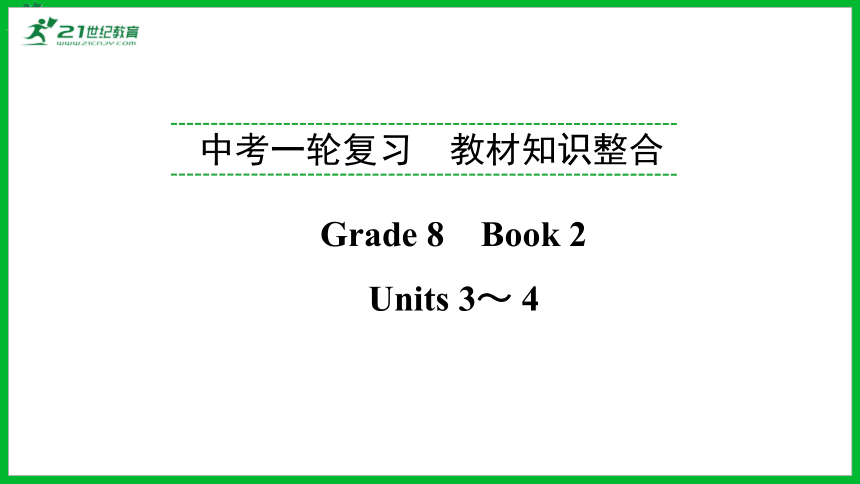 | |
| 格式 | pptx | ||
| 文件大小 | 350.5KB | ||
| 资源类型 | 试卷 | ||
| 版本资源 | 人教版 | ||
| 科目 | 英语 | ||
| 更新时间 | 2025-05-11 16:08:36 | ||
图片预览

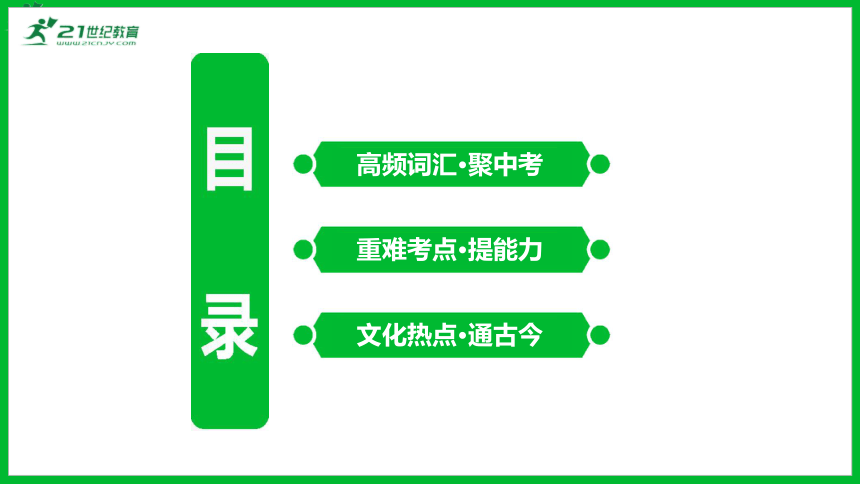
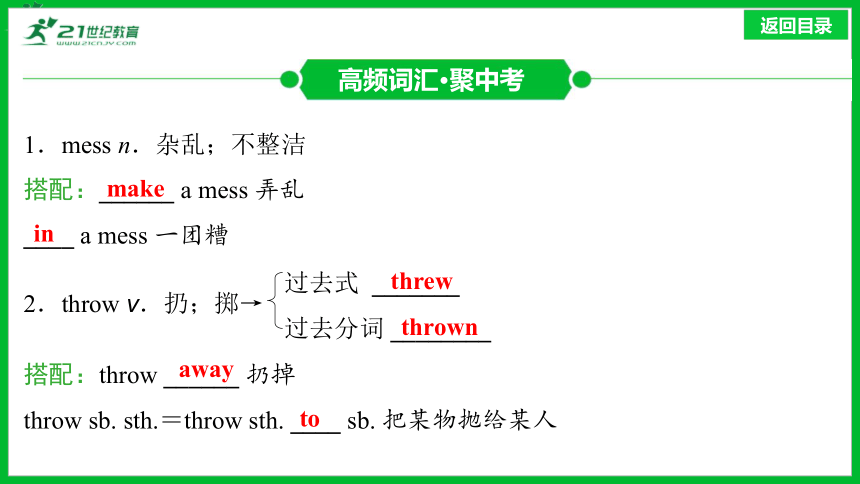
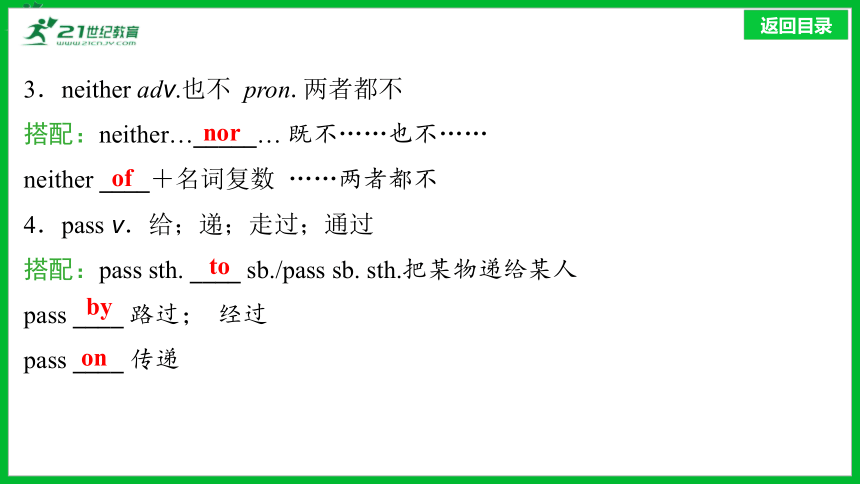
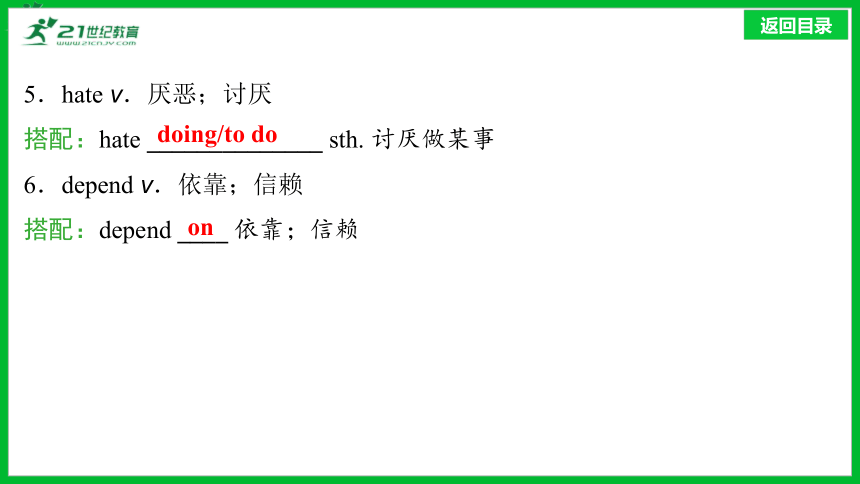
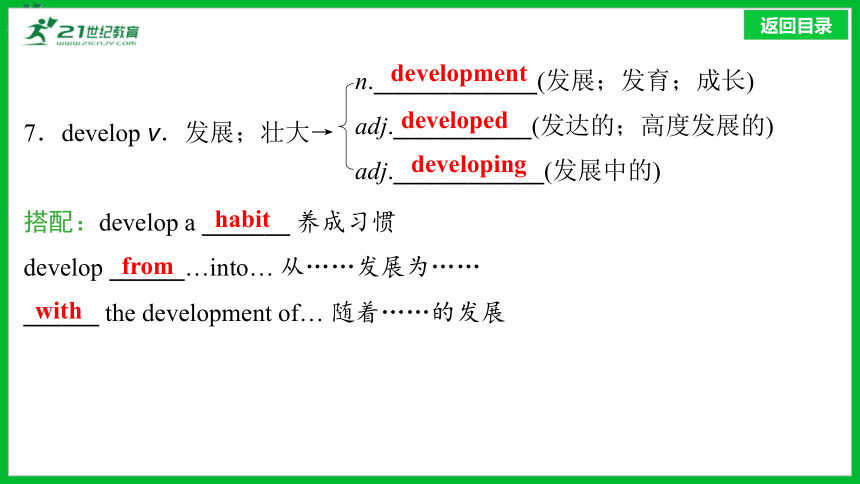
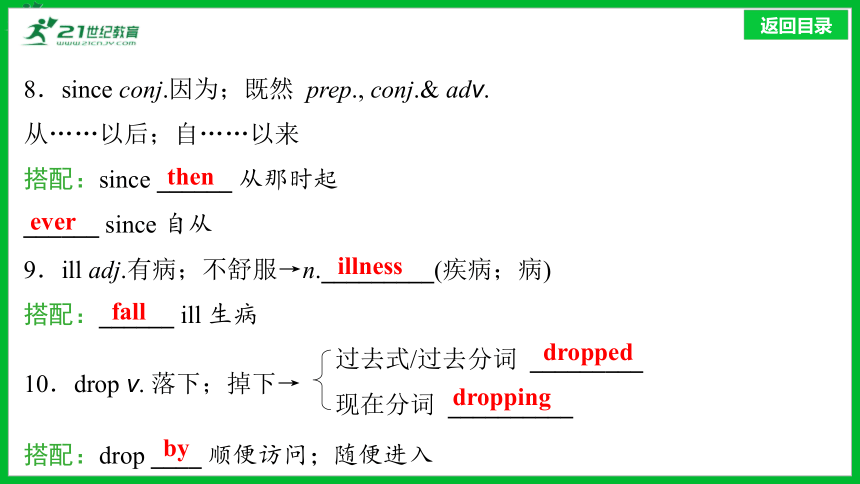
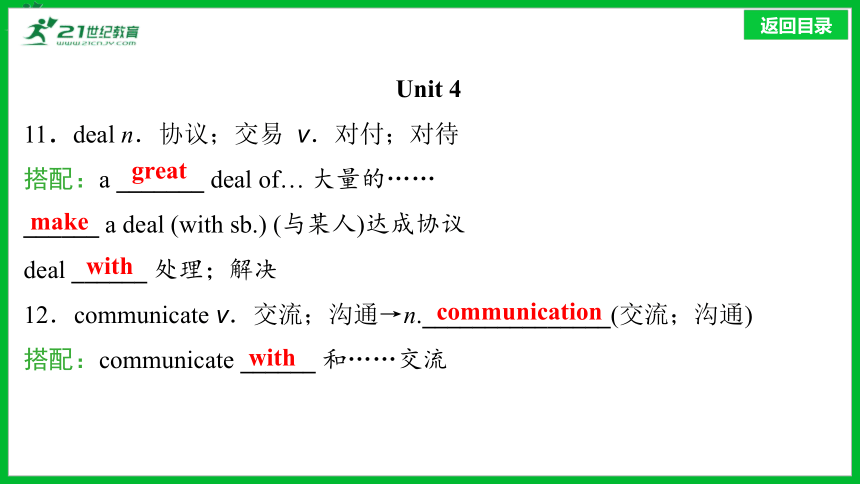
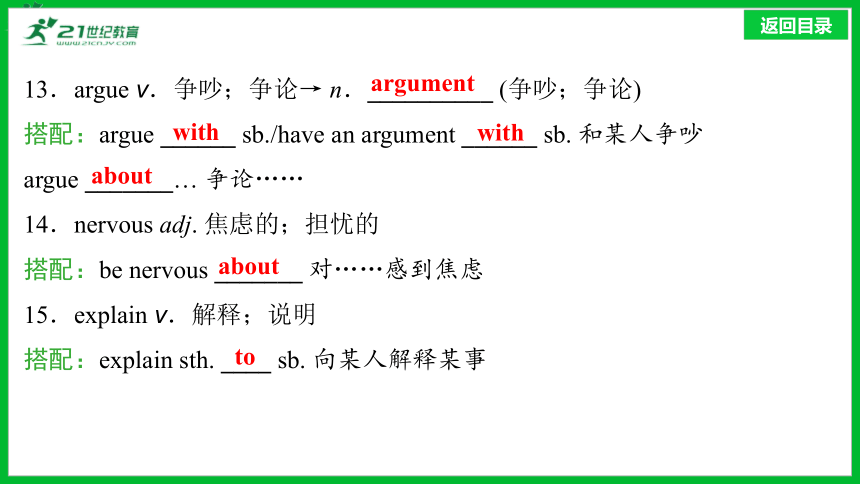
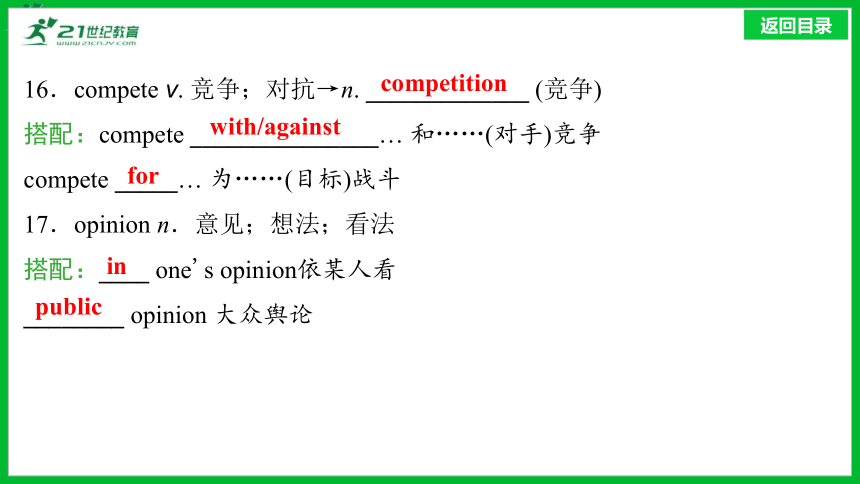
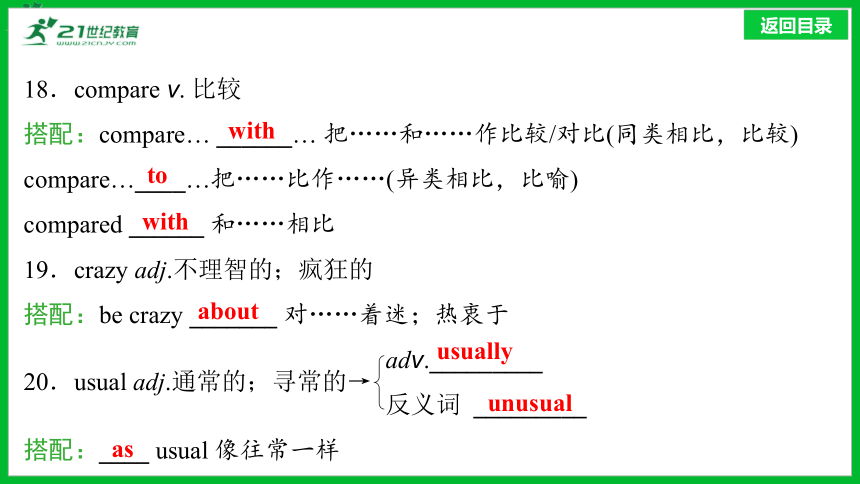
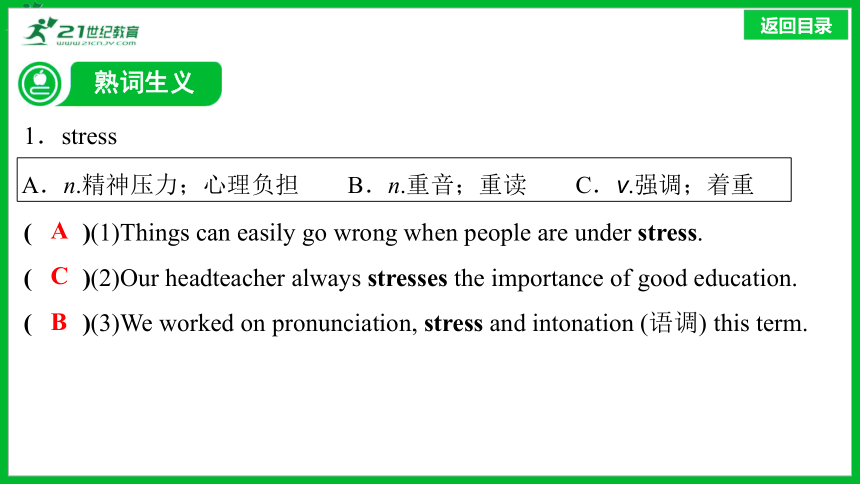
文档简介
(共40张PPT)
中考一轮复习 教材知识整合
Grade 8 Book 2
Units 3~ 4
高频词汇·聚中考
重难考点·提能力
文化热点·通古今
1.mess n.杂乱;不整洁
搭配:______ a mess 弄乱
____ a mess 一团糟
高频词汇·聚中考
2.throw v.扔;掷→
过去式 _______
过去分词 ________
搭配:throw ______ 扔掉
throw sb. sth.=throw sth. ____ sb. 把某物抛给某人
make
in
threw
thrown
away
to
3.neither adv.也不 pron.两者都不
搭配:neither…_____… 既不……也不……
neither ____+名词复数 ……两者都不
4.pass v.给;递;走过;通过
搭配:pass sth. ____ sb./pass sb. sth.把某物递给某人
pass ____ 路过; 经过
pass ____ 传递
nor
of
to
by
on
5.hate v.厌恶;讨厌
搭配:hate ______________ sth. 讨厌做某事
6.depend v.依靠;信赖
搭配:depend ____ 依靠;信赖
doing/to do
on
7.develop v.发展;壮大→
n._____________(发展;发育;成长)
adj.___________(发达的;高度发展的)
adj.____________(发展中的)
搭配:develop a _______ 养成习惯
develop ______…into… 从……发展为……
______ the development of… 随着……的发展
development
developed
developing
habit
from
with
8.since conj.因为;既然 prep., conj.& adv.
从……以后;自……以来
搭配:since ______ 从那时起
______ since 自从
9.ill adj.有病;不舒服→n._________(疾病;病)
搭配:______ ill 生病
10.drop v. 落下;掉下→
过去式/过去分词 _________
现在分词 __________
搭配:drop ____ 顺便访问;随便进入
then
ever
illness
fall
dropped
dropping
by
Unit 4
11.deal n.协议;交易 v.对付;对待
搭配:a _______ deal of… 大量的……
______ a deal (with sb.) (与某人)达成协议
deal ______ 处理;解决
12.communicate v.交流;沟通→n._______________(交流;沟通)
搭配:communicate ______ 和……交流
great
make
with
communication
with
13.argue v.争吵;争论→ n.__________ (争吵;争论)
搭配:argue ______ sb./have an argument ______ sb. 和某人争吵
argue _______… 争论……
14.nervous adj. 焦虑的;担忧的
搭配:be nervous _______ 对……感到焦虑
15.explain v.解释;说明
搭配:explain sth. ____ sb. 向某人解释某事
argument
with
with
about
about
to
16.compete v. 竞争;对抗→n. _____________ (竞争)
搭配:compete _______________… 和……(对手)竞争
compete _____… 为……(目标)战斗
17.opinion n.意见;想法;看法
搭配:____ one's opinion依某人看
________ opinion 大众舆论
competition
with/against
for
in
public
18.compare v. 比较
搭配:compare… ______… 把……和……作比较/对比(同类相比,比较)
compare…____…把……比作……(异类相比,比喻)
compared ______ 和……相比
19.crazy adj.不理智的;疯狂的
搭配:be crazy _______ 对……着迷;热衷于
20.usual adj.通常的;寻常的→
adv._________
反义词 _________
搭配:____ usual 像往常一样
with
to
with
about
usually
unusual
as
1.stress
熟词生义
A.n.精神压力;心理负担 B.n.重音;重读 C.v.强调;着重
( )(1)Things can easily go wrong when people are under stress.
( )(2)Our headteacher always stresses the importance of good education.
( )(3)We worked on pronunciation, stress and intonation (语调) this term.
A
C
B
2.drop
A.v.落下;掉下 B.n.滴;水珠 C.n.下降;下跌;减少
( )(1)My pen dropped from the desk and it was broken.
( )(2)With a water recycling system, every drop of water is used fully in the space station.
( )(3)Most parts of China will experience a rapid drop in temperatures along with snow soon.
A
B
C
3.return
A.v.归还 B.v.回来;返回
C.v.恢复;重现 D.n.回报 E.n.回归;返回
( )(1)The Shenzhou-17 astronauts returned to the earth safely on April 30, 2024.
( )(2)I must return this English magazine to the library.
( )(3)The soldier celebrated his safe return from the war.
( )(4)Smile at others, and you will receive smiles in return.
( )(5)I felt better after taking medicine but the following day the pain returned.
B
A
E
D
C
单项填空
1.-What do you think of the cute toy “Happy Loong(幸福龙)”?
-I like it very much.Many teenagers are ______about it.
A.sorry B.worried
C.crazy D.nervous
词汇攻关
C
2.-What fruit do you like best in summer
-Watermelons are my favorite.Nothing else can_____ with them.
A.deal B.compare
C.compete D.argue
B
3.-Did you have a wonderful time in Anqing
-Of course yes.It has been three years _____ I enjoyed myself so much.
A.since B.when
C.before D.that
A
4.-Traditional objects have a lasting value as they are not easy to find.
-That's why people don't _____ old things as easily as before.
A.drive out B.put up
C.take off D.throw away
D
单词拼写
5.When making plans, you should leave enough time to d_____(对付) with some unexpected things.
6.My dad sometimes goes to the supermarket with us though he h______(讨厌) going shopping.
7.The kids put their toys here and there in the room. What a m_____(杂乱)!
eal
ates
ess
【教材例句】 Housework is a waste of their time.做家务是浪费他们的时间。【八(下)Unit 3 P22】
重难考点·提能力
waste的用法
考点1
词 性 含义及用法 常见搭配及句型
动词 意为“浪费,滥用” waste sth.(time/money…) on sth. 在……上浪费某物(时间/金钱……)
waste sth.(time/money…)(in) doing sth. 浪费某物(时间/金钱……)做某事
词 性 含义及用法 常见搭配及句型
名词 意为“浪费”,是不可数名词,但可跟不定冠词a连用 a waste of浪费……
It's a waste of … doing sth. 做某事是浪费……
意为“垃圾”,是不可数名词 kitchen waste 厨余垃圾
形容词 意为“废弃的;无用的” waste paper废纸
waste water废水;污水
e.g. It's a waste to throw good food away and we should try our best to save food.扔掉好的食物是一种浪费,我们应该尽力节约食物。
If we go on wasting water like this, we'll use it up soon.如果我们继续像这样浪费水,我们很快会把水用光。
The shop shared how to make soaps with coffee waste in the coffee cultural festival.这家店在咖啡文化节上分享了如何用咖啡废料制作肥皂。
The researchers carried on the research for six months, and found that all the families continued to waste less food.研究人员进行了六个月的研究,发现所有家庭都在持续减少食物浪费。
【教材例句】 My parents don't allow me to hang out with my friends.我父母不允许我和朋友闲逛。【八(下)Unit 4 P25】
allow的用法
考点2
e.g.In my family, I am allowed to make decisions by myself.在我家里,我被允许自己做决定。
Online museums allow people to experience art and learn about world history from the comfort of their homes.网上博物馆允许人们在他们舒适的家里就可以感受艺术,了解世界历史。
【教材例句】 Could I borrow that book?我可以借那本书吗?【八(下)Unit 3 P20】
辨析borrow、lend与keep
考点3
考 点 含义及用法 常用结构 巧 记
borrow “借;借入”,非延续性动词,表示主语向别人借来东西 borrow sth. from sb.向某人借某物 主语借出用lend,主语借入用borrow,想要保存用keep
lend “借出;借给”,非延续性动词,表示主语把东西借给别人 lend sb. sth./lend sth. to sb.把某物借给某人 keep “借(多久)”,延续性动词,表示“借某物多长时间” 常与“for +一段时间”或“how long”连用 e.g. English has borrowed many words from other languages. 英语借用了许多其他语言的单词。
If you have to lend your camera to anyone, tell them to use it properly. 如果你不得不把你的相机借给别人,告诉他们要正确地使用。
I'll go to the library to return the books which I have kept for two weeks this afternoon. 今天下午我会去图书馆归还已经借了两周的书。
【教材例句】 Instead he watches whatever he wants until late at night. 相反,他却可以看他想看的任何节目直到深夜。【八(下)Unit 4 P27】
辨析instead与instead of
考点4
考 点 词性、含义及用法
instead 副词,意为“代替;反而;却”,修饰整个句子,位于句首或句末
instead of 介词短语,意为“代替,而不是”,后面跟名词、代词或动名词
e.g.As you can see, so many noes didn't beat me. Instead, they made me stronger and helped me grow. 正如你所看到的,这么多次的拒绝并没有打败我。相反,它们让我更加强大,帮助我成长。
Horses, for example, will go for a group of three apples instead of two apples. 例如,马会选择有三个苹果的那一组,而不是两个苹果的。
单项填空
1.-I left my dictionary at home.Can I ____ yours,please
-Of course.
A.lend B.borrow
C.give D.find
活学巧练
B
2.I think there is no need for us to waste money____ something useless.
A.at B.on
C.for D.with
B
3.-Did you go camping with your friends this morning
-No. I went to see old people in the old people's home ____.
A.instead B.soon
C.anyway D.later
A
单词拼写
4.It's a w______(浪费) to order too much food and leave a lot when you eat out.
5.My English teacher allows me to k_____(借) his dictionary for half a month.
6.My parents don't a______(允许) me to play skateboard because they think it's dangerous.
7.Jane is interested in science and she often b________(借) scientific books from the school library.
aste
eep
llow
orrows
文化热点·通古今
话题:中国古代的一些社交称谓 体裁:说明文 词数:约270
难度:★★★ 建议用时:6分钟 实际用时: 正确率:
Titles like quanzi and kaimo have rooted (根植于) themselves deeply into ancient Chinese history and culture. Let's have a look.
Modesty (谦逊) and respect
Chinese people in the past or even today call their sons quanzi. They believe that dogs are humble animals. ①When Chinese parents use quanzi to refer to their sons, they are being modest. Although most parents want them to be successful, they don't usually talk about this in front of others.This is similar to how even rich Chinese people call their big houses hanshe. That means “my humble home”.
②Although people are modest about themselves, they compliment others a lot. They call their own sons quanzi, but call others' sons linglang, a respectful way to say “your son”.
Trees of character
In Chinese, kaimo means a “role model”. Both of these Chinese characters have a “木”on their left side. People believe that kai and mo might be two kinds of trees in ancient China. It was said that there were many kai trees growing near Confucius's tomb (孔子墓). These trees were so straight that they made people think of Confucius's characters-straight and honest.People believed that the mo trees grew near the tomb of the Duke of Zhou (周公).③The color of the mo trees' leaves made the trees a symbol of integrity (正直).
Since the kai and mo trees grew near the tombs of two respected people, kaimo was then used to refer to role models.
1.Why do Chinese people call their sons quanzi ( )
A.To respect themselves.
B.To show their love of dogs.
C.To be modest about themselves.
D.To praise their sons.
精准检测
C
2.What does the underlined word “compliment” in Paragraph 3 probably mean ( )
A.Greet. B.Praise.
C.Understand. D.Punish.
B
3.What makes the mo trees a symbol of integrity?( )
A.The color of the mo trees' leaves.
B.The shape of the mo trees.
C.The height of the mo trees.
D.The position of the mo trees.
A
4.What's the best title for this text?( )
A.The Importance of Good Qualities
B.How to Be a Successful Person
C.Some Social Titles in Ancient China
D.How People Greeted Others in the Past
C
中考一轮复习 教材知识整合
Grade 8 Book 2
Units 3~ 4
高频词汇·聚中考
重难考点·提能力
文化热点·通古今
1.mess n.杂乱;不整洁
搭配:______ a mess 弄乱
____ a mess 一团糟
高频词汇·聚中考
2.throw v.扔;掷→
过去式 _______
过去分词 ________
搭配:throw ______ 扔掉
throw sb. sth.=throw sth. ____ sb. 把某物抛给某人
make
in
threw
thrown
away
to
3.neither adv.也不 pron.两者都不
搭配:neither…_____… 既不……也不……
neither ____+名词复数 ……两者都不
4.pass v.给;递;走过;通过
搭配:pass sth. ____ sb./pass sb. sth.把某物递给某人
pass ____ 路过; 经过
pass ____ 传递
nor
of
to
by
on
5.hate v.厌恶;讨厌
搭配:hate ______________ sth. 讨厌做某事
6.depend v.依靠;信赖
搭配:depend ____ 依靠;信赖
doing/to do
on
7.develop v.发展;壮大→
n._____________(发展;发育;成长)
adj.___________(发达的;高度发展的)
adj.____________(发展中的)
搭配:develop a _______ 养成习惯
develop ______…into… 从……发展为……
______ the development of… 随着……的发展
development
developed
developing
habit
from
with
8.since conj.因为;既然 prep., conj.& adv.
从……以后;自……以来
搭配:since ______ 从那时起
______ since 自从
9.ill adj.有病;不舒服→n._________(疾病;病)
搭配:______ ill 生病
10.drop v. 落下;掉下→
过去式/过去分词 _________
现在分词 __________
搭配:drop ____ 顺便访问;随便进入
then
ever
illness
fall
dropped
dropping
by
Unit 4
11.deal n.协议;交易 v.对付;对待
搭配:a _______ deal of… 大量的……
______ a deal (with sb.) (与某人)达成协议
deal ______ 处理;解决
12.communicate v.交流;沟通→n._______________(交流;沟通)
搭配:communicate ______ 和……交流
great
make
with
communication
with
13.argue v.争吵;争论→ n.__________ (争吵;争论)
搭配:argue ______ sb./have an argument ______ sb. 和某人争吵
argue _______… 争论……
14.nervous adj. 焦虑的;担忧的
搭配:be nervous _______ 对……感到焦虑
15.explain v.解释;说明
搭配:explain sth. ____ sb. 向某人解释某事
argument
with
with
about
about
to
16.compete v. 竞争;对抗→n. _____________ (竞争)
搭配:compete _______________… 和……(对手)竞争
compete _____… 为……(目标)战斗
17.opinion n.意见;想法;看法
搭配:____ one's opinion依某人看
________ opinion 大众舆论
competition
with/against
for
in
public
18.compare v. 比较
搭配:compare… ______… 把……和……作比较/对比(同类相比,比较)
compare…____…把……比作……(异类相比,比喻)
compared ______ 和……相比
19.crazy adj.不理智的;疯狂的
搭配:be crazy _______ 对……着迷;热衷于
20.usual adj.通常的;寻常的→
adv._________
反义词 _________
搭配:____ usual 像往常一样
with
to
with
about
usually
unusual
as
1.stress
熟词生义
A.n.精神压力;心理负担 B.n.重音;重读 C.v.强调;着重
( )(1)Things can easily go wrong when people are under stress.
( )(2)Our headteacher always stresses the importance of good education.
( )(3)We worked on pronunciation, stress and intonation (语调) this term.
A
C
B
2.drop
A.v.落下;掉下 B.n.滴;水珠 C.n.下降;下跌;减少
( )(1)My pen dropped from the desk and it was broken.
( )(2)With a water recycling system, every drop of water is used fully in the space station.
( )(3)Most parts of China will experience a rapid drop in temperatures along with snow soon.
A
B
C
3.return
A.v.归还 B.v.回来;返回
C.v.恢复;重现 D.n.回报 E.n.回归;返回
( )(1)The Shenzhou-17 astronauts returned to the earth safely on April 30, 2024.
( )(2)I must return this English magazine to the library.
( )(3)The soldier celebrated his safe return from the war.
( )(4)Smile at others, and you will receive smiles in return.
( )(5)I felt better after taking medicine but the following day the pain returned.
B
A
E
D
C
单项填空
1.-What do you think of the cute toy “Happy Loong(幸福龙)”?
-I like it very much.Many teenagers are ______about it.
A.sorry B.worried
C.crazy D.nervous
词汇攻关
C
2.-What fruit do you like best in summer
-Watermelons are my favorite.Nothing else can_____ with them.
A.deal B.compare
C.compete D.argue
B
3.-Did you have a wonderful time in Anqing
-Of course yes.It has been three years _____ I enjoyed myself so much.
A.since B.when
C.before D.that
A
4.-Traditional objects have a lasting value as they are not easy to find.
-That's why people don't _____ old things as easily as before.
A.drive out B.put up
C.take off D.throw away
D
单词拼写
5.When making plans, you should leave enough time to d_____(对付) with some unexpected things.
6.My dad sometimes goes to the supermarket with us though he h______(讨厌) going shopping.
7.The kids put their toys here and there in the room. What a m_____(杂乱)!
eal
ates
ess
【教材例句】 Housework is a waste of their time.做家务是浪费他们的时间。【八(下)Unit 3 P22】
重难考点·提能力
waste的用法
考点1
词 性 含义及用法 常见搭配及句型
动词 意为“浪费,滥用” waste sth.(time/money…) on sth. 在……上浪费某物(时间/金钱……)
waste sth.(time/money…)(in) doing sth. 浪费某物(时间/金钱……)做某事
词 性 含义及用法 常见搭配及句型
名词 意为“浪费”,是不可数名词,但可跟不定冠词a连用 a waste of浪费……
It's a waste of … doing sth. 做某事是浪费……
意为“垃圾”,是不可数名词 kitchen waste 厨余垃圾
形容词 意为“废弃的;无用的” waste paper废纸
waste water废水;污水
e.g. It's a waste to throw good food away and we should try our best to save food.扔掉好的食物是一种浪费,我们应该尽力节约食物。
If we go on wasting water like this, we'll use it up soon.如果我们继续像这样浪费水,我们很快会把水用光。
The shop shared how to make soaps with coffee waste in the coffee cultural festival.这家店在咖啡文化节上分享了如何用咖啡废料制作肥皂。
The researchers carried on the research for six months, and found that all the families continued to waste less food.研究人员进行了六个月的研究,发现所有家庭都在持续减少食物浪费。
【教材例句】 My parents don't allow me to hang out with my friends.我父母不允许我和朋友闲逛。【八(下)Unit 4 P25】
allow的用法
考点2
e.g.In my family, I am allowed to make decisions by myself.在我家里,我被允许自己做决定。
Online museums allow people to experience art and learn about world history from the comfort of their homes.网上博物馆允许人们在他们舒适的家里就可以感受艺术,了解世界历史。
【教材例句】 Could I borrow that book?我可以借那本书吗?【八(下)Unit 3 P20】
辨析borrow、lend与keep
考点3
考 点 含义及用法 常用结构 巧 记
borrow “借;借入”,非延续性动词,表示主语向别人借来东西 borrow sth. from sb.向某人借某物 主语借出用lend,主语借入用borrow,想要保存用keep
lend “借出;借给”,非延续性动词,表示主语把东西借给别人 lend sb. sth./lend sth. to sb.把某物借给某人 keep “借(多久)”,延续性动词,表示“借某物多长时间” 常与“for +一段时间”或“how long”连用 e.g. English has borrowed many words from other languages. 英语借用了许多其他语言的单词。
If you have to lend your camera to anyone, tell them to use it properly. 如果你不得不把你的相机借给别人,告诉他们要正确地使用。
I'll go to the library to return the books which I have kept for two weeks this afternoon. 今天下午我会去图书馆归还已经借了两周的书。
【教材例句】 Instead he watches whatever he wants until late at night. 相反,他却可以看他想看的任何节目直到深夜。【八(下)Unit 4 P27】
辨析instead与instead of
考点4
考 点 词性、含义及用法
instead 副词,意为“代替;反而;却”,修饰整个句子,位于句首或句末
instead of 介词短语,意为“代替,而不是”,后面跟名词、代词或动名词
e.g.As you can see, so many noes didn't beat me. Instead, they made me stronger and helped me grow. 正如你所看到的,这么多次的拒绝并没有打败我。相反,它们让我更加强大,帮助我成长。
Horses, for example, will go for a group of three apples instead of two apples. 例如,马会选择有三个苹果的那一组,而不是两个苹果的。
单项填空
1.-I left my dictionary at home.Can I ____ yours,please
-Of course.
A.lend B.borrow
C.give D.find
活学巧练
B
2.I think there is no need for us to waste money____ something useless.
A.at B.on
C.for D.with
B
3.-Did you go camping with your friends this morning
-No. I went to see old people in the old people's home ____.
A.instead B.soon
C.anyway D.later
A
单词拼写
4.It's a w______(浪费) to order too much food and leave a lot when you eat out.
5.My English teacher allows me to k_____(借) his dictionary for half a month.
6.My parents don't a______(允许) me to play skateboard because they think it's dangerous.
7.Jane is interested in science and she often b________(借) scientific books from the school library.
aste
eep
llow
orrows
文化热点·通古今
话题:中国古代的一些社交称谓 体裁:说明文 词数:约270
难度:★★★ 建议用时:6分钟 实际用时: 正确率:
Titles like quanzi and kaimo have rooted (根植于) themselves deeply into ancient Chinese history and culture. Let's have a look.
Modesty (谦逊) and respect
Chinese people in the past or even today call their sons quanzi. They believe that dogs are humble animals. ①When Chinese parents use quanzi to refer to their sons, they are being modest. Although most parents want them to be successful, they don't usually talk about this in front of others.This is similar to how even rich Chinese people call their big houses hanshe. That means “my humble home”.
②Although people are modest about themselves, they compliment others a lot. They call their own sons quanzi, but call others' sons linglang, a respectful way to say “your son”.
Trees of character
In Chinese, kaimo means a “role model”. Both of these Chinese characters have a “木”on their left side. People believe that kai and mo might be two kinds of trees in ancient China. It was said that there were many kai trees growing near Confucius's tomb (孔子墓). These trees were so straight that they made people think of Confucius's characters-straight and honest.People believed that the mo trees grew near the tomb of the Duke of Zhou (周公).③The color of the mo trees' leaves made the trees a symbol of integrity (正直).
Since the kai and mo trees grew near the tombs of two respected people, kaimo was then used to refer to role models.
1.Why do Chinese people call their sons quanzi ( )
A.To respect themselves.
B.To show their love of dogs.
C.To be modest about themselves.
D.To praise their sons.
精准检测
C
2.What does the underlined word “compliment” in Paragraph 3 probably mean ( )
A.Greet. B.Praise.
C.Understand. D.Punish.
B
3.What makes the mo trees a symbol of integrity?( )
A.The color of the mo trees' leaves.
B.The shape of the mo trees.
C.The height of the mo trees.
D.The position of the mo trees.
A
4.What's the best title for this text?( )
A.The Importance of Good Qualities
B.How to Be a Successful Person
C.Some Social Titles in Ancient China
D.How People Greeted Others in the Past
C
